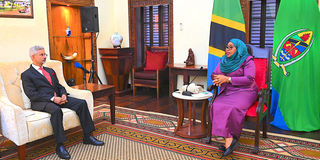Prime
Indian minister: Tanzania to lead Indo-Africa ties

President Samia Suluhu Hassan holds a meeting with the India’s External Affairs Minister, Subrahmanyam Jaishankar (left) at the state house in Dar es Salaam on Saturday.
PHOTO | STATE HOUSE
What you need to know:
India’s Minister of External Affairs, Mr Subrahmanyam Jaishankar, on Saturday held talks with President Samia Suluhu Hassan in Dar es Salaam. In this interview, the Indian minister shares with The Citizen’s Managing Editor, Mpoki Thompson, his country’s focus areas in the growing cooperation with African countries, revealing that Tanzania is strategically positioned to be the entry point to the continent.
Tell us about your current visit and what issues are high on the India-Tanzania Joint Permanent Commission meeting agenda.
My visit is about taking forward India-Tanzania cooperation. The Joint Permanent Commission plays an important role in this regard. I appreciated the guidance provided by President Dr Samia Suluhu Hassan when I called on her.
We are seeking to expand trade, grow investments, promote ICT collaboration, enhance defense and security ties, and encourage people-to-people contacts. All of this is underpinned by time-tested political understanding. We are particularly proud of our water partnership, which will bring drinking water to 8 million Tanzanians when the projects are completed.
The new flagship initiative is the decision to set up the first ever campus abroad of the globally renowned Indian Institute of Technology. This will be in Zanzibar, and I was present along with President Mwinyi of Zanzibar at the signing of the agreement.
The presence of the Indian Naval Ship Trishul at both Zanzibar and Dar es Salaam, coinciding with my visit, is an indication of our expanding defense cooperation. We have recently finalised a 5-year roadmap of cooperation. I hope that in the coming days we can focus more on education, healthcare, mining, and agriculture.
India’s Secretary for Economic Relations from the Ministry of External Affairs, Mr Dammu Ravi, said Tanzania is considered a strategic point for India’s relationship with East Africa. Beyond economics and trade, what are other key areas that define the relationship between the two countries?
As I mentioned, we are both looking at new areas as well as deepening existing ones. Prime Minister Modi strongly believes that our friendship and solidarity with Africa should be expressed in practical projects. And these must be determined by the priorities of our partners.
For India, an essential element of the changing global order is the rise of Africa. We are deeply invested in that process. When it comes to Africa, our historical familiarity is most of all with East Africa because it is closest to us geographically. In fact, even the location of the IIT campus takes into account that Zanzibar is a long-standing meeting point of African and Indian cultures.
I should add that the 55,000-strong Indian and Indian-origin community can help very much in expanding the ambit of cooperation. Both India and Tanzania have strong economic growth, and the opportunities to collaborate will only increase as a consequence.
Tanzania has witnessed great reforms in its diplomatic and economic partnerships with other countries in the past two years, with Asian and Arab countries becoming closer allies. How is India utilising this new approach by the government?
I think this opens up many new possibilities. For example, we are already working with the UAE in the health sector in Tanzania. In the past, we have had some conversations with Japan in regard to some other African countries. This is a globalised world, and India’s own growing comfort level with Arab economies can open many new pathways.
Tanzania’s external relations are designed to broaden engagement in global political and economic arenas in order to attract more foreign investment. How does the Joint Permanent Commission help enhance these targets?
The institutional mechanism of the Joint Permanent Commission is an ideal platform to discuss important issues ranging from strategic projects to issues faced by people and businesses from both countries. We successfully concluded the 10th JCM with Tanzania today, where we reviewed the entire spectrum of our bilateral relations. We identified areas where we performed well and also areas where we needed to work harder. Emerging areas of cooperation include trade in national currency, the Indian Industrial Park, space cooperation, and digital technology, among others. All in all, it was a very productive meeting. We agreed on well-balanced and achievable milestones and deliverables.
There are several institutional arrangements and protocols for facilitating Indo-Tanzania cooperation. How effective are they in implementing strategic projects in light of internal disruptions, such as a change in regulation, and also external geopolitical factors?
Apart from the Joint Commission, we have several institutional arrangements with Tanzania on trade, defense, water, and counterterrorism, to name a few. The institutional mechanisms allow focused and result-oriented discussions on specific sectors and have been helpful to both sides.
How can India promote knowledge transfer to the same levels of success or even higher than those achieved in trade relations with Tanzania?
You are right that our trade relations have been consistently improving. In terms of knowledge transfer, you would be happy to know that we offer the highest number of scholarships and capacity-building training slots to Tanzania among all countries in Africa. I have come across many successful professionals who attribute their success to education or training in India. Working with Indian experts in various sectors in Tanzania has remained a regular feature of our relationship.
We have established ICT centres at the Dar es Salaam Institute of Technology and the Nelson Mandela African Institute of Science and Technology. Indian experts in ICT are working for various organisations in Tanzania. The setting of the IIT Madras offshore campus in Zanzibar would take it to an altogether different level.
When Covid-19 hit, Tanzania, just like many other African countries, suffered vaccine discrimination. How can India use its more advanced health capabilities to develop the capacity of Tanzania’s health system?
India donated over 16 million vaccine doses to 100 countries during the pandemic, including several countries in Africa. India has a prolific pharmaceutical industry, producing a major chunk of the world’s medicines and vaccines.
The Indian government and private sector have heavily invested in healthcare and R&D (research and development), and today India is known as the Pharmacy of the World. India has also emerged as a medical tourism hub for patients from across the globe because of its world-class medical facilities at a very affordable cost. A few thousand Tanzanians travel to India every year for medical treatment.
We have good cooperation with Tanzania in the health sector. Tanzania was part of the Pan African e-Network project, which covered 47 countries in Africa.
The telemedicine component of the project connected remote hospitals in African countries to 12 superspecialty Indian hospitals. Doctors and specialists from Tanzanian hospitals and the Ministry of Health have been attending healthcare training courses in India.
Numerous Indian hospitals have deployed their experts to hospitals in Tanzania for specialised care and surgeries. We have provided indigenously made radiation therapy machines for the treatment of cancer patients at Bugando Medical Center and provided essential medicines and vaccines.
As stated earlier, last year, a high-level joint India-UAE health delegation visited Tanzania to explore opportunities for investment. Indian companies have also invested in animal vaccine and pharmaceutical plants.





